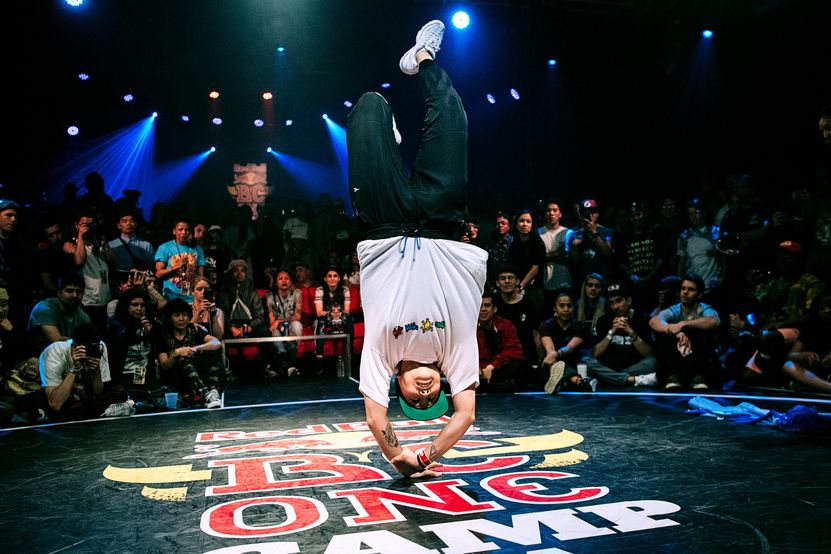 : It was the late '90s, and breaking pioneer Ana "Rokafella" Garcia was in rehearsals for a major theater production with a crew of male breakers. A popular b-boy began making comments dripping with sexual innuendo about the only other woman in the group. With each consecutive rehearsal, the harassment progressed while other castmates stood by silently.
: It was the late '90s, and breaking pioneer Ana "Rokafella" Garcia was in rehearsals for a major theater production with a crew of male breakers. A popular b-boy began making comments dripping with sexual innuendo about the only other woman in the group. With each consecutive rehearsal, the harassment progressed while other castmates stood by silently.
Community, Leadership, Experimentation, Diversity, & Education
Pittsburgh Arts, Regional Theatre, New Work, Producing, Copyright, Labor Unions,
New Products, Coping Skills, J-O-Bs...
Theatre industry news, University & School of Drama Announcements, plus occasional course support for
Carnegie Mellon School of Drama Faculty, Staff, Students, and Alumni.
CMU School of Drama
Thursday, November 04, 2021
The B-Girl's Battle for Equality in a Male-Dominated Style
Dance Magazine
 : It was the late '90s, and breaking pioneer Ana "Rokafella" Garcia was in rehearsals for a major theater production with a crew of male breakers. A popular b-boy began making comments dripping with sexual innuendo about the only other woman in the group. With each consecutive rehearsal, the harassment progressed while other castmates stood by silently.
: It was the late '90s, and breaking pioneer Ana "Rokafella" Garcia was in rehearsals for a major theater production with a crew of male breakers. A popular b-boy began making comments dripping with sexual innuendo about the only other woman in the group. With each consecutive rehearsal, the harassment progressed while other castmates stood by silently.
 : It was the late '90s, and breaking pioneer Ana "Rokafella" Garcia was in rehearsals for a major theater production with a crew of male breakers. A popular b-boy began making comments dripping with sexual innuendo about the only other woman in the group. With each consecutive rehearsal, the harassment progressed while other castmates stood by silently.
: It was the late '90s, and breaking pioneer Ana "Rokafella" Garcia was in rehearsals for a major theater production with a crew of male breakers. A popular b-boy began making comments dripping with sexual innuendo about the only other woman in the group. With each consecutive rehearsal, the harassment progressed while other castmates stood by silently.
Subscribe to:
Post Comments (Atom)
3 comments:
It makes me really sad to read about all of the sexism and misogyny in the entertainment industry, and this is no exception. All too often in these male dominated styles or industries the few women in the room are targets of sexual harassment and as this article points out everyone else “stood by silently”. This article talked about the problem with mansplaining in these break dancing environments and how that is a problem because this style was popularized my men, I think men have the idea that women doing it need help and are less experiences than they are so they are condescending to them often. I think that what Choi and Martinez are doing in creating awareness about the problem in this community and how they are encouraging young girls to stick with it and find what they are passionate about is great, and I hope will make a difference for someone, even if just one person.
Complex power dynamics exist so strongly within artistic fields. The various intersections of various hierarchies come into play in a very intense manner when it comes to the arts because what is art if not emotion and expression. B-girls and this specific genre of dance is no different. They have repeatedly faced discrimation for physical differences, and are disadvantaged by cultural bias and blatant sexism, on top of the historically masculine origins of this genre--it was born from the hip-hop movement in the early 70s, thought to have originated in the South Bronx through Black and Latinx youth. Now, women like Rokafella and Sunny Choi advocate for more equality and equity in the genre, from equal pay to heightened visibility and representation. With the rise of TV and the commercialization of the genre, the industry has changed over time, but what industry hasn't? For better or worse, it has changed, and hopefully for women in the industry, it continues shifting to something better.
Breaking is such a male dominated sport and form of art that it’s long-rooted culture of sexism seems like a norm to many people. It goes without saying that there must have been uncountable times when b-girls like Rockafella has faced discrimination and harassment. In the article, Sunny Choi said that women and men are built differently, meaning that women have to work extra hard in order to master a move. Yet their efforts are hardly ever recognised by peers and are even judged by the society as breaking seems “unladylike”. There are obviously huge issues with the power dynamic and exclusion between genders in the breaking community, but this also reflects how the society is still very much biased towards men. This is quite evident as many breaking dancers are hesitant to speak up, whether if they are afraid or if they don’t see this as an issue. As the breaking culture gets more popular, hopefully awareness is raised on the inequality issue, and that more b-girls can unite to support each other.
Post a Comment